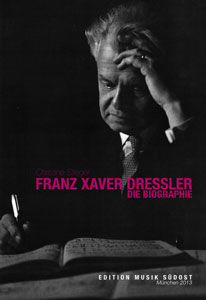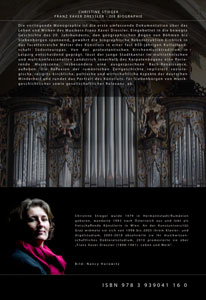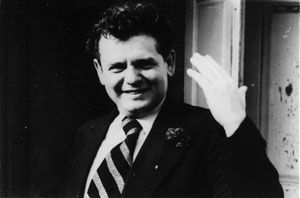|
|
|||||||||||||||||||||||||||
|
Neuerscheinung 2013:
Christine Stieger: Franz Xaver Dressler (1898-1981). Die Biographie Edition Musik Südost, München 2013 ISBN 978 3 939041 16 0 360 Seiten, 92 Abbildungen Preis: 19,50 €
Die vorliegende Monographie ist die erste umfassende Dokumentation über das Leben und Wirken des Musikers Franz Xaver Dressler. Eingebettet in die bewegte Geschichte des 20. Jahrhunderts, den geographischen Bogen von Böhmen bis Siebenbürgen spannend, gewährt die biographische Rekonstruktion Einblick in das facettenreiche Metier des Künstlers in einer fast 850-jährigen Kulturlandschaft Südosteuropas. Die deutsche Enklave in Rumänien kann über Jahrhunderte hinweg dem politischen und demographischen Wandel trotzen und bietet Dressler ein fruchtbares Ambiente, um seine Gaben als Organist, Chorleiter, Pädagoge und Komponist zu entfalten. Von der protestantischen Kirchenmusiktradition in Leipzig entscheidend geprägt, lässt der junge Stadtkantor in seinem Wirkungsbereich eine florierende Musikszene, insbesondere eine ausgesprochene Bach-Renaissance, aufleben. Auch die politische Wende nach 1933 und 1944 vermag Dresslers Schaffenskraft nicht zum Erliegen zu bringen. Aufgrund seines unerbittlichen Versuches, eine Brücke zwischen sakralem Kirchenraum und profanem Umfeld zu schlagen, ist Kirchenmusik im Kommunismus - selbstverständlich Kompromisse fordernd - möglich. Dass seine Leistungen multikonfessionellen und multiethnischen Zuspruch finden, spiegeln sowohl Beiträge in Fach- und Tagespresse als auch die Vielfalt der religiösen und nationalen Zugehörigkeit seiner Schüler und seines Publikums sowie die Dokumentation seiner Auftritte als Organist und Dirigent im In- und Ausland wider. Die Reflexion der rumänischen Zeitgeschichte impliziert soziologische, religiös-kirchliche, politische und wirtschaftliche Aspekte der deutschen Minderheit und trägt zur Abrundung des Künstlerportraits, für Siebenbürgen von musikgeschichtlicher und gesellschaftlicher Relevanz, bei.
The monograph at hand is the first comprehensive documentation of the life and work of the musician Franz Xaver Dressler. Embedded in the eventful history of the 20th century, including a wide geographic scope from Bohemia to Transylvania, the biographic reconstruction grants an insight into the artists diverse field of activities in the nearly 850year old cultural landscape of South East Europe. The German enclave in Romania has been able to defy both political and demographical changes over the centuries and offered Dressler a fertile cultural environment to develop his gifts as an organist, choirmaster, teacher and composer. Decisively influenced by the tradition of protestant churchmusic during his time in Leipzig, the young cantor revived the formaly thriving music scene of Transylvania, triggering a veritable Bach-renaissance. Even the political changes of 1933 and 1944 did not have a disrupting effect on his creativity and enthusiasm regarding musical life in his sphere of influence. As a result of Dresslers relentless attempts to establish ties between the sacral and the profane, church music was able to survive communism – nevertheless not without compromises. His achievements have been well received from both a multi-denominational and multi-ethnical vantage point. This fact has been reflected not only in professional journals and the daily press as well as in the religious and national identity of his students and audiences, but also in the documentation of his national and international performances as an organist and conductor. A generel reflection on the relevant historical background in Romania regarding sociological, church-religious, political and economical aspects of the German minority completes the portrait of an artist, who has been and still is paramount to the music history of Transylvania.
Copyright © EDITION MUSIK SÜDOST, München 2013 |
| [Home] [Bücher] [Der Temeswarer Philharmonische Verein 1871] [Josef Angster] [Te Deum laudamus] [Beiträge] [Haydn Johann Michael] [Von Liedertafeln] [Eine Reise] [Musik als... (1)] [Musik als... (2)] [Trummer / Engels: Kirchenmusik] [Molnar Kirchenmusik in Ungarn] [Kirchenlied] [Gesangbuch] [Hermannstadt 2003] [Dressler] [Noten] [CD] [Musikwissenschaft] [Kontakt] [Impressum] [Links] [Konzert] |

 Abstract
Abstract